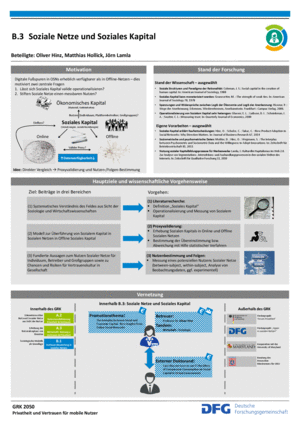The term “social capital” refers to the total amount of current and potential resources, which can be associated with the participation in the social network of mutual knowing and acknowledging. Unlike the human capital, the social capital does not refer to the individual actor of a system per se, but on the relationships between the actors in this system. Thereby trust is an important dimension of social capital, so that the phenomenon of social capital is closely related to the core themes of the RTG.
Social capital provides individuals access to resources of the social life, such as support, assistance, recognition, knowledge and connections or even the finding of jobs and training positions. Due to the increasing distribution of social networks and availability of 'digital footprints', both the influence of social capital on dependent variables as well as the emergence of social capital can be better explained scientifically. In this respect, new opportunities arise to promote empirical analyses in this area. This illustrates the usefulness of this information, but also the urgent need for privacy protection. Again, the RTG can utilize its frequently discussed interdisciplinary approach in order to combine findings from sociology, economics and computer science at this interesting interface. While B.1 aims to improve the understanding and modeling of trust and trust evaluation, B.2 tries to reach a design-oriented enhancement of privacy protection. B.3 seeks to examine the outcomes that can be created with the (newly developed) social capital.



